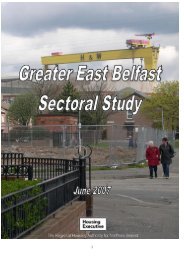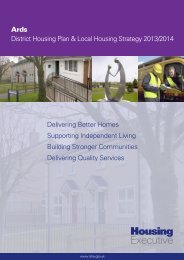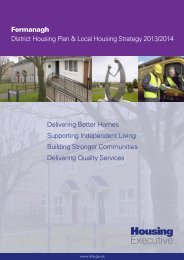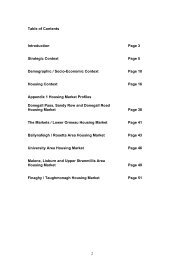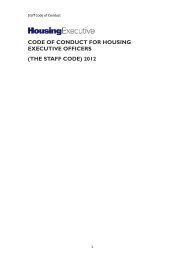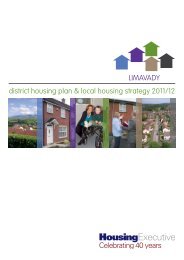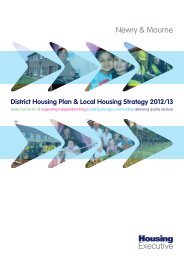The Housing Selection Scheme Consultation Paper - Northern ...
The Housing Selection Scheme Consultation Paper - Northern ...
The Housing Selection Scheme Consultation Paper - Northern ...
Create successful ePaper yourself
Turn your PDF publications into a flip-book with our unique Google optimized e-Paper software.
<strong>Consultation</strong> on Changes to the<br />
<strong>Housing</strong> <strong>Selection</strong> <strong>Scheme</strong><br />
November 2012
Contents<br />
Background 3<br />
<strong>The</strong> <strong>Housing</strong> <strong>Selection</strong> <strong>Scheme</strong> 3<br />
Purpose and Scope of the <strong>Consultation</strong> 4<br />
Bedrooms - <strong>Housing</strong> Benefit Occupancy Rules 5<br />
Key Proposals 7<br />
Ensuring New Tenants are not Under-Occupying 7<br />
Minimum Bedroom Requirements 7<br />
Overcrowding Rules 11<br />
Interim Offers Policy 11<br />
Policy Succession and Assignment 11<br />
Supporting Existing Tenants 12<br />
Under-Occupation Points 13<br />
Allocations to Transfers 14<br />
Access to the Transfer List/Consent to a Mutual Exchange 14<br />
Mobility and Mutual Exchange <strong>Scheme</strong>s 15<br />
Creation of Joint Tenancies 15<br />
Impact on Local Lettings Plans 15<br />
Equality 17<br />
Rural Proofing 18<br />
Summary of <strong>Consultation</strong> Questions 19<br />
How to Respond 21<br />
Next Steps 22<br />
Proposals for Changes to the <strong>Housing</strong> <strong>Selection</strong> <strong>Scheme</strong> 2
Background<br />
<strong>The</strong> <strong>Housing</strong> <strong>Selection</strong> <strong>Scheme</strong><br />
<strong>The</strong> <strong>Housing</strong> (<strong>Northern</strong> Ireland) Order, 1981 (Article 22) provides the statutory<br />
framework for the <strong>Housing</strong> <strong>Selection</strong> <strong>Scheme</strong>. <strong>The</strong> <strong>Housing</strong> Executive must<br />
submit a scheme for determining the order of allocation of <strong>Housing</strong> Executive<br />
tenancies. Any amendments to the statutory scheme must be submitted to the<br />
Department for Social Development for approval.<br />
In 2000 the <strong>Housing</strong> Executive and Registered <strong>Housing</strong> Associations in <strong>Northern</strong><br />
Ireland, having established a Common Waiting List for all social housing in<br />
<strong>Northern</strong> Ireland, agreed to participate in a Common <strong>Selection</strong> <strong>Scheme</strong> and<br />
since then the <strong>Housing</strong> Executive’s <strong>Housing</strong> <strong>Selection</strong> <strong>Scheme</strong> has been used as<br />
the basis on which all social housing is allocated in <strong>Northern</strong> Ireland, whether<br />
owned and managed by the <strong>Housing</strong> Executive or any of the registered <strong>Housing</strong><br />
Associations.<br />
<strong>The</strong> <strong>Housing</strong> <strong>Selection</strong> <strong>Scheme</strong> is first and foremost a tool for assessing and<br />
ranking the need of individual households who apply for social housing in<br />
<strong>Northern</strong> Ireland and allocating homes on the basis of that assessed need and<br />
ranking. In addition, tenants who wish to transfer within their landlord’s stock or<br />
across the pool of social housing are also assessed and ranked as applicants<br />
under the rules of the <strong>Housing</strong> <strong>Selection</strong> <strong>Scheme</strong>. <strong>The</strong> <strong>Scheme</strong> provides for the<br />
award of points to applicants for housing need factors such as insecurity of<br />
tenure, housing conditions, and health/social well-being, with the overall<br />
accumulation of points determining the position and ranking of an applicant on<br />
the waiting list.<br />
A full copy of the current rules of the <strong>Housing</strong> <strong>Selection</strong> <strong>Scheme</strong> can be found on<br />
the <strong>Housing</strong> Executive’s website at:<br />
http://www.nihe.gov.uk/housing_selection_scheme_rules.pdf<br />
Proposals for Changes to the <strong>Housing</strong> <strong>Selection</strong> <strong>Scheme</strong> 3
Purpose and Scope of the <strong>Consultation</strong><br />
In 2011 a preliminary consultation was carried out on proposals to amend a<br />
number of key aspects of the <strong>Housing</strong> <strong>Selection</strong> <strong>Scheme</strong>. <strong>Housing</strong> Executive and<br />
DSD officers subsequently jointly developed a number of options for<br />
modernisation of the <strong>Scheme</strong> which contained an option for a potentially radical<br />
examination of what factors should be taken into account in determining the<br />
priority for the allocation of social housing.<br />
This work was reported to the Minister in early 2012 and, as a result, the Minister<br />
has recently announced a fundamental review of allocations policy in <strong>Northern</strong><br />
Ireland. <strong>The</strong> fundamental review will be conducted by independent consultants<br />
and will consider overarching strategic issues.<br />
It will take some time to research, develop, consult and implement change on<br />
such a scale and, in the interim, while that broader work is being carried out, it is<br />
recognised that important amendments will be required as a matter of priority to<br />
the existing <strong>Housing</strong> <strong>Selection</strong> <strong>Scheme</strong> in light of the Government’s programme<br />
of Welfare Reform.<br />
<strong>The</strong> Welfare Reform Act, affecting Great Britain, received Royal Assent in March<br />
2012. <strong>The</strong> Act provides for the most fundamental programme of welfare reform<br />
for sixty years. A similar Welfare Reform Bill has been developed for <strong>Northern</strong><br />
Ireland, and is currently being debated by the <strong>Northern</strong> Ireland Executive and will<br />
be subject to approval by the Assembly. <strong>The</strong> Bill proposes corresponding<br />
changes here and, if implemented, many of the current benefits will cease to<br />
exist and a new Universal Credit will replace several benefits and new payment<br />
systems will be introduced. Information on universal credit and other elements of<br />
welfare reform can be found on the NI Direct Website: www.nidirect.gov.uk<br />
If the Welfare Reform Bill is passed, and <strong>Northern</strong> Ireland maintains parity with<br />
Great Britain, from 1 April 2013 a size criteria will be introduced for new and<br />
existing working-age 1 <strong>Housing</strong> Benefit claimants living in the social rented sector.<br />
This size criteria will replicate that which applies to <strong>Housing</strong> Benefit claimants in<br />
the private rented sector and whose claims are assessed using the local housing<br />
allowance rules. <strong>The</strong> tenant’s maximum rent will be reduced by a national<br />
percentage rate depending on how many bedrooms the household is considered<br />
to be under-occupying. <strong>The</strong> change will only apply to working-age <strong>Housing</strong><br />
Benefit claimants. New and existing <strong>Housing</strong> Benefit claims from those claimants<br />
who have reached the qualifying age for state pension credit will be unaffected<br />
by this measure.<br />
<strong>The</strong> size criteria measure is the only element of the Welfare Reform Bill which<br />
affects social landlords alone.<br />
1 By April 2013 the qualifying age for state pension credit is 61 rising to 62 years by the following<br />
April so, a tenant who is aged 62 or older before 6 April 2013 (or more precisely anyone born<br />
before 6 October 1951) will not be subject to the size criteria.<br />
Proposals for Changes to the <strong>Housing</strong> <strong>Selection</strong> <strong>Scheme</strong> 4
Making best use of social housing stock is one of the aims of the size criteria.<br />
<strong>The</strong> Government intention is that, by moving away from a system of benefit that<br />
pays for any sized home regardless of household need, movement will be<br />
created within social housing stock ensuring that the resulting vacancies are<br />
targeted towards those who need them most.<br />
Size criteria - Key Points<br />
• the size criteria will apply to new and existing working age housing benefit<br />
claimants in the social rented sector.<br />
• the measure is due to come into effect from 1 April 2013.<br />
• by April 2013 the qualifying age for state pension credit is 61 rising to 62<br />
years by the following April so, a tenant who is aged 62 or older before 6 April<br />
2013 (or more precisely anyone born before 6 October 1951) will not be<br />
subject to the size criteria.<br />
• <strong>Housing</strong> Benefit claimants will be assessed to establish the size of<br />
accommodation the tenant and their household are deemed to reasonably<br />
need (see section on ‘Bedrooms - <strong>Housing</strong> Benefit Occupancy Rules)<br />
• those who are assessed as under-occupying for housing benefit purposes will<br />
have their housing benefit reduced by a percentage rate of their eligible rent<br />
depending on the number of bedrooms they are deemed to be underoccupying:14%<br />
for one extra bedroom 25% for two or more extra bedrooms<br />
• a tenant on partial housing benefit will have the size criteria applied in the<br />
same way as those on full housing benefit. So, if a tenant whose rent is £80<br />
per week receives £40 per week housing benefit and is under-occupying by<br />
two bedrooms, their benefit will be reduced by 25 per cent of the £80 rent, not<br />
25 per cent of the £40 housing benefit - a reduction of £20 per week rather<br />
than £10.<br />
Bedrooms - <strong>Housing</strong> Benefit Occupancy Rules<br />
<strong>The</strong> size of bedroom, for example, single, twin or double, will not be taken into<br />
account and living rooms, kitchens and bathrooms will not be included in the<br />
assessment.<br />
One bedroom is allowed for:<br />
• each adult couple<br />
• any other person aged 16 or over<br />
• two children of the same sex under the age of 16<br />
• two children regardless of sex under the age of 10<br />
• any other child<br />
• a carer, or one of a team of carers, who has a home elsewhere, who uses a<br />
spare bedroom on a regular basis to stay overnight because the claimant or<br />
their partner requires overnight care.<br />
Proposals for Changes to the <strong>Housing</strong> <strong>Selection</strong> <strong>Scheme</strong> 5
<strong>The</strong>re is no distinction between larger and smaller bedrooms for housing benefit<br />
purposes, for example, a house with one double bedroom and two single<br />
bedrooms will be a three bedroom property.<br />
<strong>The</strong> size criteria do not apply to:<br />
• those over state pension credit age<br />
• those in shared ownership schemes<br />
• those in sheltered or supported housing who have support services provided<br />
by a not for profit landlord. 2<br />
Otherwise, there are no exceptions to this which means that:<br />
• if separated parents share childcare, the child will only be taken account of in<br />
calculating the property size for the housing benefit claim of the designated<br />
‘main carer’ – if care is shared exactly equally the main carer will usually be<br />
the parent that receives child benefit<br />
• parents whose children visit but are not part of the household are not<br />
assessed as needing an extra bedroom for housing benefit.<br />
• foster children will not be considered when assessing whether or not a home<br />
is under-occupied.<br />
• couples using a spare bedroom, for example when recovering from illness will<br />
still be considered to be under-occupying<br />
• disabled people living in adapted or specially designed properties which have<br />
more bedrooms than are permitted by the size criteria will have their housing<br />
benefit reduced, unless designated as supported ‘exempt’ accommodation.<br />
• disabled children who because of their age would be expected to share with<br />
siblings, will not be entitled to a separate bedroom. 3<br />
2 This is a particular type of supported accommodation defined for housing benefit purposes as<br />
accommodation provided by a non-metropolitan county council in England, a housing association,<br />
a registered charity or voluntary organisation, where that body or a person acting on its behalf<br />
also provides the claimant with care, support or supervision<br />
3 <strong>The</strong> judgment in the Court of Appeal decision in the cases of Burnip, Trengove and Gorry<br />
concerns size criteria for Local <strong>Housing</strong> Allowance, including the need for an additional room for<br />
children with serious disabilities where it may be inappropriate for them to share a bedroom.<br />
It was unanimously held that the size criteria discriminated unlawfully against the three<br />
appellants, on grounds of disability, by not including provision to meet their need for an additional<br />
room. In light of the fact that leave to appeal to the Supreme Court has been sought the DSD has<br />
recommended that, although a decision of the Court of Appeal in GB is highly persuasive, it is not<br />
binding in NI and therefore should not be followed at present.<br />
Proposals for Changes to the <strong>Housing</strong> <strong>Selection</strong> <strong>Scheme</strong> 6
Key Proposals<br />
Ensuring New Tenants are not Under-Occupying<br />
<strong>The</strong> <strong>Housing</strong> Executive and registered <strong>Housing</strong> Associations as participating<br />
landlords in a Common <strong>Selection</strong> <strong>Scheme</strong> recognise that a comprehensive<br />
approach to allocations and housing options is a key element to responding to<br />
the introduction of <strong>Housing</strong> Benefit size restrictions for both existing and future<br />
tenants (new and current applicants). As Social Landlords we seek, as far as<br />
reasonably possible, to allocate accommodation to applicants in line with the<br />
<strong>Housing</strong> Benefit size restriction policy to mitigate any adverse impacts on new<br />
tenants and potential financial hardship and risk of arrears incurring next April<br />
2013 when the changes are due to take effect.<br />
It is in this context, mindful of the need to make the best use of stock in future<br />
allocations and support existing tenants affected by the changes that the <strong>Housing</strong><br />
Executive has identified a number of rules of the <strong>Housing</strong> <strong>Selection</strong> <strong>Scheme</strong><br />
which require further consideration and propose a number of changes which are<br />
deemed necessary to re-align allocation policies with welfare reform.<br />
Amendments to Minimum Bedroom Requirements - Schedule 3 of the<br />
Rules of the <strong>Housing</strong> <strong>Selection</strong> <strong>Scheme</strong><br />
<strong>The</strong> <strong>Housing</strong> Executive’s current allocation policy determines the accommodation<br />
needs of applicants based on the <strong>Housing</strong> <strong>Selection</strong> <strong>Scheme</strong>’s Minimum<br />
Bedroom Requirements which are contained in Schedule 3 of the Rules. This<br />
Schedule is used as the basis by which Allocating Officers decide what is a<br />
reasonable offer in line with Rule 57.<br />
(A) Changes to Age Criteria<br />
<strong>The</strong> ages at which children are expected to share bedrooms for the purposes of<br />
allocations currently differ to the age criteria contained in the proposed size<br />
restrictions rules in the forthcoming reform of <strong>Housing</strong> Benefit. (See Table 1)<br />
Proposals for Changes to the <strong>Housing</strong> <strong>Selection</strong> <strong>Scheme</strong> 7
Table 1: Examples of how the Size Criteria Might Apply to a Household with<br />
Children compared to the rules of the current <strong>Housing</strong> <strong>Selection</strong> <strong>Scheme</strong><br />
Household<br />
A household<br />
comprising of a<br />
lone parent with<br />
two children, a<br />
boy aged three<br />
and girl aged<br />
eight years<br />
Current <strong>Housing</strong><br />
<strong>Selection</strong> <strong>Scheme</strong><br />
Rules<br />
Would qualify for a<br />
three bedroom<br />
house, one for the<br />
lone parent and one<br />
each for the children<br />
as the children are of<br />
different sex and one<br />
is over the age of 7<br />
years.<br />
New <strong>Housing</strong><br />
Benefit Rules from<br />
1st April 2013<br />
Will qualify for<br />
housing benefit for a<br />
two bedroom home -<br />
one bedroom for the<br />
lone parent and a<br />
second for the<br />
children as they are<br />
both under 10 and<br />
expected to share.<br />
Impact of New<br />
<strong>Housing</strong> Benefit<br />
Rules<br />
If this family were<br />
housed in a three<br />
bedroom house in<br />
line with the current<br />
<strong>Housing</strong> <strong>Selection</strong><br />
<strong>Scheme</strong> rules they<br />
would have to pay<br />
the difference in<br />
rent of<br />
approximately £7 to<br />
£10 per week<br />
A household of a<br />
couple with three<br />
children: two boys<br />
aged two years<br />
and five years<br />
and a girl aged 11<br />
years old.<br />
Would be assessed<br />
as requiring three<br />
bedrooms - one for<br />
the couple, one for<br />
the two boys who<br />
would be expected to<br />
share and a separate<br />
bedroom for the girl<br />
aged 11.<br />
Will qualify for<br />
housing benefit for a<br />
three bedroom home<br />
- one for the couple,<br />
one for the two boys<br />
and a third for the girl<br />
aged 11.<br />
This household<br />
scenario would not<br />
be affected by the<br />
<strong>Housing</strong> Benefit<br />
size restriction.<br />
A household with<br />
a couple and<br />
three children, a<br />
girl of 6 and two<br />
boys aged 12 and<br />
16 years.<br />
Would be assessed<br />
as requiring three<br />
bedrooms - one for<br />
the couple, one for<br />
the two boys who<br />
would be expected to<br />
share until the older<br />
reached 18 years<br />
and a separate<br />
bedroom for the girl<br />
aged 6.<br />
Will qualify for<br />
housing benefit for<br />
four bedrooms - one<br />
for the couple; a<br />
separate one for the<br />
boy aged 16; a<br />
separate one for the<br />
boy aged 12 years<br />
and a separate<br />
bedroom for the girl<br />
of 6.<br />
This household<br />
would be entitled to<br />
a greater number of<br />
bedrooms under<br />
the new <strong>Housing</strong><br />
Benefit rules than<br />
under the current<br />
allocation rules in<br />
the <strong>Housing</strong><br />
<strong>Selection</strong> <strong>Scheme</strong>.<br />
Our Proposal: It is recommended that Schedule 3 of the <strong>Housing</strong> <strong>Selection</strong><br />
<strong>Scheme</strong> Rules should be amended to bring the age criteria for minimum<br />
bedroom requirements into line with that used for <strong>Housing</strong> Benefit purposes. This<br />
will mean that two children of different genders will now be expected to share up<br />
to the age 10 years (currently up to 7 years) and children of any age of the same<br />
Proposals for Changes to the <strong>Housing</strong> <strong>Selection</strong> <strong>Scheme</strong> 8
sex will be expected to share up to 16 years (currently 18 years), while persons<br />
of 16 years and above will be determined to require a bedroom of their own<br />
(currently 18 years). This proposed change will mean that while younger children<br />
of different sex will be expected to share a bedroom for longer, until age 10, on<br />
the other hand, it will be more generous for older children who will be assessed<br />
as requiring their own bedroom from age 16.<br />
This change is viewed as essential to re-align the allocations policy with the<br />
<strong>Housing</strong> Benefit regulations and ensure in so far as reasonably practical that new<br />
allocations make best use of housing stock and do not result in underoccupation.<br />
<strong>Consultation</strong> Question 1<br />
Do you agree with the recommendation that the Age Criteria for Children sharing<br />
bedrooms should be amended as outlined in line with the proposed amendments<br />
to <strong>Housing</strong> Benefit Regulations?<br />
(B) Allocations of Difficult-to-Let Properties<br />
Under the current rules of the <strong>Housing</strong> <strong>Selection</strong> <strong>Scheme</strong>, allocations resulting in<br />
under-occupation are on occasion made where there are good housing<br />
management grounds to applicants with smaller households, often single<br />
persons, in areas where housing need has been met or where a particular<br />
property has been identified as difficult to let in order to prevent or minimise<br />
voids.<br />
Our Proposal: It is proposed to retain this flexibility to enable participating<br />
landlords to make allocations in such circumstances. Working age tenants on<br />
housing benefit in these circumstances will be advised before they accept the<br />
offer that they will need to consider how they would meet any potential shortfall in<br />
rent as a result of the potential <strong>Housing</strong> Benefit restriction.<br />
<strong>Consultation</strong> Question 2<br />
Do you agree with the proposal to retain flexibility to make allocations to<br />
applicants who do not meet the minimum bedroom requirements for difficult-to-let<br />
areas or properties?<br />
(C) Parents with Access to Children who do not Permanently Reside with<br />
them<br />
<strong>The</strong> <strong>Housing</strong> Executive recognises the need for a parent(s) to have an additional<br />
bedroom to facilitate access arrangements to children who do not permanently<br />
reside with them and currently calculates minimum bedroom requirements and<br />
makes allocations on this basis. However, the proposed <strong>Housing</strong> Benefit size<br />
restriction does not recognise this need and from April 2013 such a bedroom will<br />
Proposals for Changes to the <strong>Housing</strong> <strong>Selection</strong> <strong>Scheme</strong> 9
e considered as under-occupied with the consequent reduction in <strong>Housing</strong><br />
Benefit for the tenant.<br />
Our Proposal: <strong>The</strong> <strong>Housing</strong> Executive has reviewed this allocation policy and<br />
proposes to continue with the policy of allocating an additional bedroom in such<br />
circumstances. Working age tenants in receipt of housing benefit in these<br />
circumstances will be advised before they accept the offer of accommodation<br />
that they will need to consider how they would meet any potential shortfall in rent<br />
as a result of the potential <strong>Housing</strong> Benefit restriction.<br />
<strong>Consultation</strong> Question 3<br />
Do you agree with the proposal to continue to make allocations to certain<br />
applicants of one bedroom more than their minimum requirements to facilitate<br />
access to children?<br />
(D) Flexibility to Make Allocations One Bedroom in Excess of Minimum<br />
Requirements<br />
<strong>The</strong> <strong>Housing</strong> Executive recognises that there are circumstances where a<br />
Participating Landlord may decide to make an allocation which is above the<br />
applicant’s bedroom requirements for good housing management reasons.<br />
<strong>The</strong>se may include:<br />
• Allocations to applicants where smaller accommodation, particularly onebedroom<br />
accommodation does not exist or turnover of smaller sized<br />
accommodation is very low.<br />
• Allocations where a property has special features / adaptations which would<br />
particularly meet the needs of the applicant or applicant’s household.<br />
Working age tenants in receipt of housing benefit in these circumstances will be<br />
advised before they accept the offer of accommodation that they will need to<br />
consider how they would meet any potential shortfall in rent. as a result of the<br />
potential <strong>Housing</strong> Benefit restriction.<br />
<strong>Consultation</strong> Question 4<br />
Do you agree with the proposal to retain the flexibility to make allocations one<br />
bedroom in excess of an applicant’s minimum bedroom requirements for good<br />
housing management reasons as outlined?<br />
Proposals for Changes to the <strong>Housing</strong> <strong>Selection</strong> <strong>Scheme</strong> 10
Overcrowding Rules<br />
<strong>The</strong> <strong>Housing</strong> <strong>Selection</strong> <strong>Scheme</strong> contains rules which determine whether a<br />
household is classified as overcrowded. As outlined above, the ages at which<br />
children are expected to share bedrooms are currently not aligned with those in<br />
the proposed <strong>Housing</strong> Benefit size restrictions.<br />
Our Proposal: It is recommended that the <strong>Housing</strong> <strong>Selection</strong> <strong>Scheme</strong> age<br />
criteria for determining overcrowding assessments (Rule 29) should be brought<br />
in line with that used for <strong>Housing</strong> Benefit purposes in order to ensure a consistent<br />
approach and applicants are not re-housed in circumstances where the property<br />
is deemed to be under-occupied.<br />
<strong>Consultation</strong> Question 5<br />
Do you agree that Rule 29 should be amended to bring the age criteria for<br />
sharing bedrooms in line with the proposed <strong>Housing</strong> Benefit size restriction?<br />
Interim Offers Policy<br />
<strong>The</strong> <strong>Housing</strong> Executive has developed a Communication Strategy to ensure that<br />
applicants, tenants and customers of the <strong>Housing</strong> Executive are advised of the<br />
implications of Welfare Reform and changes to benefits. A key part of that<br />
strategy is to ensure that Waiting List applicants, particularly those who will be<br />
offered a tenancy during the remainder of this financial year prior to the <strong>Housing</strong><br />
Benefit reforms in April 2013, are aware of the impending changes including the<br />
age criteria for minimum bedroom requirements and the potential financial<br />
implications. It is important to advise current applicants on the Waiting List when<br />
they are receiving an offer of the proposed changes to <strong>Housing</strong> Benefit. <strong>The</strong><br />
<strong>Housing</strong> Executive has amended the suite of <strong>Housing</strong> Executive and <strong>Housing</strong><br />
Association letters of offer to ensure applicants and transferring tenants’ are<br />
aware of the size restriction which is expected to take effect from April 2013 and<br />
to consider the potential financial impact.<br />
Tenancy Sign Up<br />
In addition, further advice and information has been added to the tenancy sign-up<br />
process informing new tenants of the potential impact of welfare reform<br />
provisions and how this might affect them. Tenants are also being advised that<br />
changes in household composition resulting in under-occupancy may affect their<br />
<strong>Housing</strong> Benefit entitlement for example family breakdown, children leaving<br />
home or the death of a family member. <strong>The</strong> signing of a financial undertaking<br />
should be considered where an allocation is awarded for a property above the<br />
new tenant’s bedroom requirements.<br />
Policy Succession and Assignment<br />
Rules 74, 75 and 77 of the <strong>Housing</strong> <strong>Selection</strong> <strong>Scheme</strong> provide for specific<br />
circumstances where a person who does not have a statutory entitlement to a<br />
Proposals for Changes to the <strong>Housing</strong> <strong>Selection</strong> <strong>Scheme</strong> 11
succession or assignment may be awarded a tenancy. However the <strong>Housing</strong><br />
Executive is concerned that decisions to award a tenancy to an applicant who<br />
meets the policy Assignment and Succession criteria as outlined may not make<br />
best use of stock and may result in under occupation and potential financial<br />
hardship for the new tenant. Working age tenants in receipt of housing benefit in<br />
these circumstances will be advised before they accept the offer that they will<br />
need to consider how they would meet any potential shortfall in rent as a result of<br />
the potential <strong>Housing</strong> Benefit restriction.<br />
Our Proposal: <strong>The</strong> relevant rules should be amended to clarify that the landlord<br />
may decide to withhold consent in such circumstances where the new tenancy is<br />
likely to or would result in under occupation and potential financial hardship.<br />
<strong>Consultation</strong> Question 6<br />
Do you agree with the proposal that a tenant who is awarded a policy succession<br />
or policy assignment and is under-occupying their property should be advised of<br />
the potential impact on a housing benefit application and will be asked to make a<br />
financial declaration of responsibility for any shortfall in rent?<br />
Supporting Existing Tenants who wish to Downsize<br />
<strong>The</strong> <strong>Housing</strong> Executive has identified that over 32,500 4 <strong>Housing</strong> Executive and<br />
<strong>Housing</strong> Association tenants who are of working age and in receipt of <strong>Housing</strong><br />
Benefit would be affected by the size restriction and deemed to be underoccupying<br />
their home. This is approximately one in four households living in<br />
social housing in <strong>Northern</strong> Ireland (See Table 2).<br />
Table 2: <strong>Housing</strong> Executive and <strong>Housing</strong> Association Tenants affected by<br />
Size Restriction<br />
No. of<br />
NIHE<br />
Tenants<br />
Affected<br />
No. of HA<br />
Tenants<br />
Affected<br />
Total<br />
Social<br />
Sector<br />
Tenants<br />
Total Tenants 89,000 34,000 123,000<br />
Tenants in Receipt of HB 68,300 24,400 92,700<br />
Working Age Tenants in receipt of HB 43,600 15,000 58,600<br />
Tenants Affected by Size Restriction 26,168 6,262 32,430<br />
No. Under occupied by 1 bedroom<br />
(Avg. Weekly HB Reduction)<br />
No. Under occupied by 2 bedrooms or more<br />
(Avg. Weekly HB Reduction)<br />
18,850<br />
(£8.25)<br />
7,318<br />
(£14.70)<br />
5,046<br />
(£9.24)<br />
1,216<br />
(£17.48)<br />
23,896<br />
8,534<br />
4 This figure relates to data extracted from housing benefit files matched with property records in<br />
May 2012 and is subject to fluctuation as a result of housing benefit change in circumstances and<br />
household occupancy.<br />
Proposals for Changes to the <strong>Housing</strong> <strong>Selection</strong> <strong>Scheme</strong> 12
Many tenants will choose not to move and to stay and pay the difference<br />
between their housing benefit award and their full rent charge; however some<br />
may not be able to meet the shortfall and may decide to move to avoid financial<br />
hardship, rent arrears and the risk of losing their home and becoming homeless.<br />
We are expecting that the demand for transfers is likely to rise sharply as some<br />
tenants try to move to smaller, more affordable homes. <strong>The</strong> majority of the<br />
tenants who will be affected are single people and couples with no children living<br />
in the household (16,000 NIHE tenants and 3456 <strong>Housing</strong> Association tenants).<br />
Consequently, there may be increased demand for tenants to downsize to one<br />
bedroom homes.<br />
As landlords it is important that we provide support and advice to our tenants in<br />
these circumstances and that we ensure that the <strong>Housing</strong> <strong>Selection</strong> <strong>Scheme</strong><br />
gives due recognition to under-occupying tenants who are impacted by this size<br />
restriction and suffering financial hardship. <strong>The</strong> <strong>Housing</strong> Executive must consider<br />
whether the level of recognition within the <strong>Housing</strong> <strong>Selection</strong> <strong>Scheme</strong> given to<br />
under-occupying tenants is set at a high enough level to enable them to move if<br />
they need to. <strong>The</strong> <strong>Housing</strong> <strong>Selection</strong> <strong>Scheme</strong> currently recognises the needs of<br />
tenants who are under-occupying through the award of Under-Occupation points.<br />
Under-Occupation Points<br />
Under-Occupation Points are currently awarded only to a social housing tenant if<br />
his / her current accommodation exceeds the needs of the tenant’s household,<br />
and all other persons residing in the dwelling, in respect of the number and size<br />
of available bedrooms. 10 points are awarded for each bedroom in excess of the<br />
requirements (using the same criteria applied to determine Overcrowding points).<br />
<strong>The</strong> maximum number of points that may be awarded for Under Occupation is 30<br />
i.e. 3 bedrooms in excess of requirements.<br />
Following careful consideration it is the view that this level of points may not be<br />
sufficient to allow tenants who are affected by this change to ‘compete’ for<br />
allocations, given that many tenants do not have any other housing need factors<br />
and traditionally accumulate limited points under the <strong>Housing</strong> <strong>Selection</strong> <strong>Scheme</strong>.<br />
It is of interest that in Great Britain the Localism Act (2011) removed most<br />
transferring tenants from the allocation rules, thereby allowing local authorities<br />
the flexibility to give additional priority to existing tenants affected by the size<br />
criteria who wish to move to smaller accommodation. While the <strong>Housing</strong><br />
Executive is aware of the need to give due priority to new applicants in housing<br />
need, it recognises that it needs to balance this with the needs of existing tenants<br />
who need to move out of a home larger than they require and which they cannot<br />
afford. <strong>The</strong> <strong>Housing</strong> Executive and registered <strong>Housing</strong> Associations as<br />
participating landlords in a Common selection <strong>Scheme</strong> are of the view that<br />
under-occupying tenants affected by the size restriction should be treated as a<br />
priority group regardless of housing need, particularly if they are living in the type<br />
of home which is in demand.<br />
Proposals for Changes to the <strong>Housing</strong> <strong>Selection</strong> <strong>Scheme</strong> 13
Allocations to Transfers - Rule 72<br />
Rule 72 of the <strong>Scheme</strong> contains a general principle when making allocations to<br />
transfer applicants that a ratio of one transfer allocation for every two Waiting List<br />
allocations should be employed. Underlying this rule, within guidance, is a policy<br />
of awarding ‘Management Transfer status’ to certain categories of tenants to<br />
allow Designated Officers the flexibility to make best use of their housing stock<br />
by allowing Officers the discretion to transfer tenants, under certain<br />
circumstances, without reference to their points level.<br />
Our Proposal: It is proposed that the <strong>Housing</strong> <strong>Selection</strong> <strong>Scheme</strong> should relax<br />
the transfer: applicant allocations ratio and introduce a new Management<br />
Transfer category which will prioritise transferring tenants who are underoccupying<br />
and wish to downsize, thereby freeing up the resulting vacancy to<br />
applicants on the Waiting List in housing need.<br />
<strong>Consultation</strong> Question 7<br />
Do you agree with the proposal that the <strong>Housing</strong> <strong>Selection</strong> <strong>Scheme</strong> should relax<br />
the current transfer: applicant allocations ratio and include an additional priority<br />
Management Transfer category to address the needs of tenants who are under<br />
occupying and are seeking to move to a smaller more affordable home?<br />
Access to the Transfer List/Consent to a Mutual Exchange<br />
<strong>The</strong> <strong>Housing</strong> Executive seeks to ensure that its policy on transfers does not pose<br />
any barriers to those tenants affected by the size restriction wishing to downsize.<br />
<strong>The</strong>refore it is recognised that the current policy of refusing access to the transfer<br />
list to tenants who have held that tenancy for less than two years and to those<br />
tenants who are in rent arrears of four or more weeks should be amended.<br />
Our Proposal: It is proposed on the basis of good housing management that this<br />
access criterion is waived for tenants who have incurred arrears as a direct<br />
consequence of the shortfall in <strong>Housing</strong> Benefit due to size restriction. Similarly,<br />
the <strong>Housing</strong> Executive may wish to consent to a request for a suitable Mutual<br />
Exchange (Assignment by Way of Exchange) for those tenants who are in<br />
arrears as a direct result of the shortfall in <strong>Housing</strong> Benefit due to the size<br />
restriction.<br />
<strong>Consultation</strong> Question 8<br />
Do you agree with the proposal that the criteria for access to the transfer list and<br />
the discretion to withhold consent to a request for a Mutual Exchange should be<br />
amended in circumstances where the tenant is under occupying and impacted by<br />
the size restriction and seeks to move to smaller accommodation?<br />
Proposals for Changes to the <strong>Housing</strong> <strong>Selection</strong> <strong>Scheme</strong> 14
Mobility and Mutual Exchange <strong>Scheme</strong>s<br />
Rules 80 to 83 of the <strong>Housing</strong> <strong>Selection</strong> <strong>Scheme</strong> are rules which relate to<br />
National Mobility <strong>Scheme</strong>s which no longer exist and therefore should be<br />
removed. <strong>The</strong> government recently launched a new HomeSwap Direct initiative,<br />
a national mobility web based scheme which facilitate tenant exchange across<br />
the UK. Subject to any legal constraints, <strong>The</strong> <strong>Housing</strong> Executive and registered<br />
housing associations are keen to offer tenants various mobility options and are<br />
currently exploring the options to participate in this initiative.<br />
<strong>Consultation</strong> Question 9<br />
Do you agree with the proposal to enable tenant exchange across the UK?<br />
Creation of Joint Tenancies<br />
<strong>The</strong> <strong>Housing</strong> <strong>Selection</strong> <strong>Scheme</strong> currently contains rules (78-79) which specify the<br />
circumstances in which a participating landlord may consent to the creation of a<br />
joint tenancy. Generally, the specified circumstances require that the current<br />
tenant and the proposed joint tenant (other than a spouse or civil partner) have<br />
been residing in the current tenant’s household for a period of at least one year.<br />
<strong>The</strong> <strong>Housing</strong> Executive recognises that it may be beneficial to relax these rules<br />
to allow sole tenants to have a joint tenancy with another person, thereby<br />
improving their ability to address issues of under-occupation and pay any<br />
shortfall in rent arising from a reduction in <strong>Housing</strong> Benefit.<br />
Our Proposal: It is proposed to amend the relevant rules to remove the 12<br />
month residence requirement for a proposed joint tenant when considering an<br />
application for a change in tenancy from a sole tenancy to a joint tenancy.<br />
<strong>Consultation</strong> Question 10<br />
Do you agree with the proposal to remove the existing 12 month residence<br />
requirement for the creation of joint tenancies?<br />
Impact on Local Lettings Plans<br />
Under Rule 84 of the <strong>Housing</strong> <strong>Selection</strong> <strong>Scheme</strong> the <strong>Housing</strong> Executive and<br />
<strong>Housing</strong> Associations have, through the authority of the Board and Department,<br />
developed local lettings plans to deliver balanced and sustainable communities,<br />
to increase demand and tackle issues such as anti-social behaviour. Applying<br />
these local lettings policies often mean that people are allocated homes which<br />
have more bedrooms than they are deemed to need under the size criteria and<br />
those homes may no longer be affordable once the size criteria is introduced.<br />
<strong>The</strong> <strong>Housing</strong> Executive and <strong>Housing</strong> Associations recognise that it will be<br />
necessary to review this approach in the light of the size criteria to establish if<br />
their use means that working age people on housing benefit are offered homes<br />
which are larger than the size criteria. It will be necessary to consider if we<br />
Proposals for Changes to the <strong>Housing</strong> <strong>Selection</strong> <strong>Scheme</strong> 15
decide to stop using them, how else we might be able to balance communities.<br />
We will need to review these policies to check that they are still sustainable and<br />
consider if some re-designation or flexibility, if needed, is possible. As part of this<br />
it is important to consult and work closely with existing residents as any decisions<br />
taken will impact on them.<br />
For example policies may:<br />
• designate certain flats for ‘Mature/Elderly’ residents. This age-based local<br />
lettings plan facilitates lettings to older people to ensure the quiet and<br />
peaceful enjoyment of the neighbourhood. However, this policy may result in<br />
a restricted supply of units for younger people affected by the size criteria to<br />
transfer to. <strong>The</strong> Designated Lettings Policy under Rule 70A will require<br />
review.<br />
• avoid housing families with young children (under 10 years) in larger, upper<br />
floor flats - which means that single people and couples without children are<br />
allocated those units and, following the introduction of the size criteria, they<br />
may be under-occupying and unable to afford to live there.<br />
<strong>Consultation</strong> Question 11<br />
Do you agree that the local lettings policies should be reviewed in light of the<br />
impending size restriction?<br />
Proposals for Changes to the <strong>Housing</strong> <strong>Selection</strong> <strong>Scheme</strong> 16
Equality<br />
Section 75 of the <strong>Northern</strong> Ireland Act 1998 requires the <strong>Housing</strong> Executive in<br />
carrying out its functions to have due regard to the need to promote equality of<br />
opportunity:<br />
• between persons of different religious belief, political opinion, racial group,<br />
age, marital status or sexual orientation;<br />
• between men and women generally;<br />
• between persons with a disability and persons without; and<br />
• between persons with dependants and persons without.<br />
Without prejudice to the obligations set out above, the <strong>Housing</strong> Executive is also<br />
required, in carrying out its functions relating to <strong>Northern</strong> Ireland, to have regard<br />
to the desirability of promoting good relations between persons of different<br />
religious belief, political opinion or racial group.<br />
<strong>The</strong> Department for Social Development carried out a full Equality Impact<br />
Assessment of the Welfare Reform Bill in April 2012.<br />
http://www.dsdni.gov.uk/wefare-reform-bill-completed-eqia-april-2012.doc<br />
<strong>The</strong> <strong>Housing</strong> Executive will undertake an equality screening of the proposals<br />
contained in this paper. <strong>The</strong> purpose of the screening is to assess different<br />
impact of the proposals on the Section 75 groups outlined above. This screening<br />
will help inform the development of these proposals. However if the screening<br />
identifies adverse (or major) impacts, consideration will be given to a full equality<br />
impact assessment.<br />
<strong>Consultation</strong> Question 12<br />
Do you have any information to help inform the screening process? Are there any<br />
particular equality issues that you feel should be taken into account in the<br />
screening (or equality impact assessment)?<br />
Proposals for Changes to the <strong>Housing</strong> <strong>Selection</strong> <strong>Scheme</strong> 17
Rural Proofing<br />
Rural proofing is a commitment by Government to ensure that policies take<br />
account of rural circumstances and needs. An initial screening of the proposed<br />
changes to the <strong>Housing</strong> <strong>Selection</strong> <strong>Scheme</strong> has been undertaken to consider rural<br />
issues. <strong>The</strong> following issues have been identified relevant to rural areas:<br />
1. It is probable that relocating households to smaller housing will be harder in<br />
rural areas because of the housing stock and the distances involved.<br />
Research undertaken by the University of Cambridge in England shows that<br />
under-occupation is more common in rural than in urban areas. Contributory<br />
factors include the lower level of smaller properties in rural areas and an older<br />
rural demographic. An examination of similar issues here is currently ongoing<br />
but indications are that a similar situation exists in <strong>Northern</strong> Ireland.<br />
2. While infrastructure varies in rural areas it is generally weaker, in terms of<br />
both information technology and physical networks. This could create<br />
particular issues in ensuring that information on the proposed amendments is<br />
accessible for rural dwellers.<br />
In relation to 1, the proposed changes are primarily designed to address issues<br />
and where possible alleviate problems arising from Welfare Reform. While the<br />
out-workings of Welfare Reform arising from <strong>Housing</strong> Benefit size criteria may<br />
have a differential impact in rural areas, when the proposed HSS changes apply,<br />
they will provide similar mitigation in both urban and rural areas. <strong>The</strong> specific<br />
changes proposed to the <strong>Housing</strong> <strong>Selection</strong> <strong>Scheme</strong> have a general applicability<br />
(i.e. there is no difference in their application depending on where you live) and<br />
as such do not have any bias towards or against rural areas.<br />
In relation to 2, we acknowledge the importance of accessible information and in<br />
this context, need to ensure that those affected by shortfalls in housing benefit<br />
are aware of the implications; this applies both to existing tenants and to those<br />
applying for or taking up tenancies. As proposed communication involves direct<br />
contact with those affected either by letter or - when signing up for tenancies -<br />
face-to face interviews, this will ensure that those affected in rural areas are<br />
aware of the implications involved.<br />
In effect therefore, from the examination to date, the proposed changes to the<br />
<strong>Housing</strong> <strong>Selection</strong> <strong>Scheme</strong> do not appear to have any potential for an adverse<br />
differential impact on rural areas.<br />
<strong>Consultation</strong> Question 13<br />
Do you have any evidence to suggest that the proposals within this paper would<br />
create any adverse differential impact on rural areas?<br />
Proposals for Changes to the <strong>Housing</strong> <strong>Selection</strong> <strong>Scheme</strong> 18
Summary of <strong>Consultation</strong> Questions<br />
<strong>Consultation</strong> Question 1<br />
Do you agree with the recommendation that the Age Criteria for Children sharing<br />
bedrooms should be amended as outlined in line with the proposed amendments<br />
to <strong>Housing</strong> Benefit Regulations?<br />
<strong>Consultation</strong> Question 2<br />
Do you agree with the proposal to retain flexibility to make allocations to<br />
applicants who do not meet the minimum bedroom requirements in difficult-to-let<br />
areas or properties?<br />
<strong>Consultation</strong> Question 3<br />
Do you agree with the proposal to continue to make allocations to certain<br />
applicants of one bedroom more than their minimum requirements to facilitate<br />
access to children?<br />
<strong>Consultation</strong> Question 4<br />
Do you agree with the proposal to retain the flexibility to make allocations one<br />
bedroom in excess of an applicant’s minimum bedroom requirements for good<br />
housing management reasons as outlined?<br />
<strong>Consultation</strong> Question 5<br />
Do you agree that Rule 29 should be amended to bring the age criteria for<br />
sharing bedrooms in line with the proposed <strong>Housing</strong> Benefit size restriction?<br />
<strong>Consultation</strong> Question 6<br />
Do you agree with the proposal that tenants who are awarded a policy<br />
succession or policy assignment and are under-occupying their property should<br />
be advised of the potential impact on a housing benefit application and will be<br />
asked to make a financial declaration of responsibility for any shortfall in rent?<br />
<strong>Consultation</strong> Question 7<br />
Do you agree with the proposal that the <strong>Housing</strong> <strong>Selection</strong> <strong>Scheme</strong> should relax<br />
the current transfer: applicant allocations ratio and include an additional priority<br />
Management Transfer category to address the needs of tenants who are under<br />
occupying and are seeking to move to a smaller more affordable home?<br />
<strong>Consultation</strong> Question 8<br />
Do you agree with the proposal that the criteria for access to the transfer list and<br />
the discretion to withhold consent to a request for a Mutual Exchange should be<br />
amended in circumstances where the tenant is under occupying and impacted by<br />
the size restriction and seeks to move to smaller accommodation?<br />
<strong>Consultation</strong> Question 9<br />
Do you agree with the proposal to allow tenant exchange across the UK?<br />
Proposals for Changes to the <strong>Housing</strong> <strong>Selection</strong> <strong>Scheme</strong> 19
<strong>Consultation</strong> Question 10<br />
Do you agree with the proposal to remove the existing 12 month residence<br />
requirement for the creation of joint tenancies?<br />
<strong>Consultation</strong> Question 11<br />
Do you agree that the local lettings policies should be reviewed in light of the<br />
impending size restriction?<br />
<strong>Consultation</strong> Question 12<br />
Do you have any information to help inform the screening process? Are there any<br />
particular equality issues that you feel should be taken into account in the<br />
screening (or equality impact assessment)?<br />
<strong>Consultation</strong> Question 13<br />
Do you have any evidence to suggest that the proposals within this paper would<br />
create any adverse differential impact on rural areas?<br />
Proposals for Changes to the <strong>Housing</strong> <strong>Selection</strong> <strong>Scheme</strong> 20
How to Respond<br />
We would welcome your views on the proposals contained in this paper and the<br />
various consultation questions summarised above.<br />
<strong>The</strong> consultation period will run from date to date 15th November 2012 to 24th<br />
January 2013. Further copies of the consultation document are available on the<br />
<strong>Housing</strong> Executive’s website (www.nihe.gov.uk/index/consultations) or by<br />
contacting us at the address below.<br />
If this document is not in a format that suits your needs, please contact us and<br />
we can discuss alternative arrangements.<br />
Unless respondents indicate otherwise, all responses to this consultation may be<br />
published in full or summary form. You should also note that the <strong>Housing</strong><br />
Executive is subject to the Freedom of Information Act 2000. This means that we<br />
have to consider any request made to us under the Act for information relating to<br />
responses made to this consultation.<br />
Responses by email are particularly encouraged for ease of compilation. E-mail:<br />
fiona.neilan@nihe.gov.uk. Or alternatively please send your responses to us by<br />
24th January 2013 to the following address:<br />
Fiona Neilan<br />
<strong>Housing</strong> Policy<br />
<strong>Northern</strong> Ireland <strong>Housing</strong> Executive<br />
<strong>The</strong> <strong>Housing</strong> Centre<br />
2 Adelaide Street<br />
Belfast<br />
BT2 8PB<br />
Telephone: (028) 9031 8240<br />
Text phone: 0845 6504381<br />
Fax: (028) 9031 8258<br />
Proposals for Changes to the <strong>Housing</strong> <strong>Selection</strong> <strong>Scheme</strong> 21
Next Steps<br />
Following the end of the consultation period, the <strong>Housing</strong> Executive’s Board and<br />
Department for Social Development will wish to fully consider the views of respondents<br />
before making any determination on the proposals. All views and proposals will be<br />
subject to an equality impact assessment.<br />
When a decision has been reached NIHE will publish a final report including a summary<br />
of responses to the consultation on the proposals, detailing how the issues raised have<br />
been considered and, where appropriate, any action that will be taken as a result.<br />
Subsequently, the <strong>Housing</strong> Executive’s Board and the Department will be asked to<br />
consider and approve necessary amendments to the <strong>Housing</strong> <strong>Selection</strong> <strong>Scheme</strong>.<br />
<strong>The</strong> changes to <strong>Housing</strong> Benefit to introduce the size restriction are due to come into<br />
effect in April 2013 and therefore the <strong>Housing</strong> Executive aims to introduce the<br />
amendments proposed in this consultation paper to coincide with that date.



